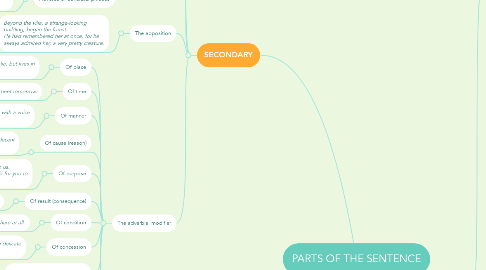
1. Ways of expressing parts of the sentence
1.1. Word-forms
1.2. Phrases
1.3. Predicative complexes
1.4. Clauses
2. SECONDARY
2.1. The object
2.1.1. A noun in the common case or a nominal phrase, a substantivized adjective or participle
2.1.1.1. I saw the boys two hours ago.
2.1.2. A noun-pronoun
2.1.2.1. I don't know anybody here
2.1.3. A numeral or a phrase with a numeral.
2.1.3.1. At last he found three of them high up in the hills.
2.1.4. A gerund or a gerundial phrase.
2.1.4.1. He insists coming.
2.1.5. An infinitive or an infinitive phrase.
2.1.5.1. She was glad to be walking with him.
2.1.6. Various predicative complexes.
2.1.6.1. I want it done at once.
2.2. The attribute
2.2.1. An adjective
2.2.1.1. I’ve never seen a better place.
2.2.2. Adjectival phrases
2.2.2.1. He stood and raged within himself with sour despair, unable to move or say a word.
2.2.3. Pronouns or pronominal phrases
2.2.3.1. Here’s some money for you
2.2.4. Numerals, ordinal or cardinal
2.2.4.1. He arrived just three weeks ago
2.2.5. Gerund or gerundial phrase
2.2.5.1. Her walking shoes were elegant
2.2.6. Adverbs or adverbial phrases
2.2.6.1. Somebody appeared on the upstairs balcony.
2.3. The apposition
2.3.1. Beyond the villa, a strange-looking building, began the forest. He had remembered her at once, for he always admired her, a very pretty creature.
2.4. The adverbial modifier
2.4.1. Of place
2.4.1.1. John was born in Australia, but lives in England.
2.4.2. Of time
2.4.2.1. We shall meet tomorrow.
2.4.3. Of manner
2.4.3.1. She said the last words with a voice lowered.
2.4.4. Of cause (reason)
2.4.4.1. Thanks to my parents I got a decent education.
2.4.5. Of purpose
2.4.5.1. Jane has come to help us. I’ve repeated my words for you to remember them.
2.4.6. Of result (consequence)
2.4.6.1. It is too cold to go out.
2.4.7. Of condition
2.4.7.1. But for you I wouldn’t be here at all.
2.4.8. Of concession
2.4.8.1. Though a bad painter, he had a delicate feeling for art.
2.4.9. Of attendant circumstances and subsequent events
2.4.9.1. We walked three miles without meeting anyone (and did not meet anyone)
2.4.10. Of comparison
2.4.10.1. A mountain is higher than a hill.
2.4.11. Of degree
2.4.11.1. The story is extremely long. All was planned to the split second.
2.4.12. Of measure
2.4.12.1. We walked (for) five miles. The box weighs a ton.
2.4.13. Of exception
2.4.13.1. I looked everywhere except in the bedroom.
3. MAIN
3.1. The Subject
3.1.1. Every English sentence but the one-member and the imperative one must have a subject. The subject is one of the two main parts of the, sentence.
3.1.2. Ways of expressing
3.1.2.1. By noun in the common case (including substantivized adjectives and participles) or a nominal phrase with a noun
3.1.2.1.1. The fog is thinning. Science is not omnipotent. The blue of the sky deepened visibly
3.1.2.2. By a personal pronoun in the nominative case
3.1.2.2.1. I shall do the best I can. She is very beautiful.
3.1.2.3. By any other noun-pronoun
3.1.2.3.1. Nothing can be done about it. This is the last straw.
3.1.2.4. By a numeral (either cardinal or ordinal) or a nominal phrase with a numeral.
3.1.2.4.1. Seven cannot be divided by two. Two of them were left in the camp.
3.1.2.5. By an nfinitive or an infinitive phrase.
3.1.2.5.1. To understand is to forgive. To deny the past is to deny the future.
3.1.2.6. By a gerund or a gerundial phrase.
3.1.2.6.1. Talking mends no holes.
3.1.2.7. By any word or words used as quotations.
3.1.2.7.1. “And” is a conjunction.
3.1.3. Grammatical types
3.1.3.1. Notional
3.1.3.1.1. By a clause (then called a subject clause), which makes the whole sentence a complex one.
3.1.3.1.2. Personal
3.1.3.1.3. Non-personal
3.1.3.2. Formal
3.1.3.2.1. Impersonal
3.1.3.2.2. Introductory
3.2. Predicate
3.2.1. The predicate is the second main part of the sentence and its organizing centre, as the object and nearly all adverbial modifiers are connected with, and dependent on, it.
3.2.2. Simple
3.2.2.1. Verbal
3.2.2.1.1. Is expressed by
3.2.2.2. Nominal
3.2.2.2.1. Is expressed by
3.2.2.3. to be, to feel, to sound, to smell, to taste, to look, to appear, to seem, etc.
3.2.3. Compound
3.2.3.1. Verbal
3.2.3.1.1. Phrasal
3.2.3.1.2. Modal
3.2.3.1.3. Of absolute orientation
3.2.3.2. Nominal
3.2.3.2.1. Proper
